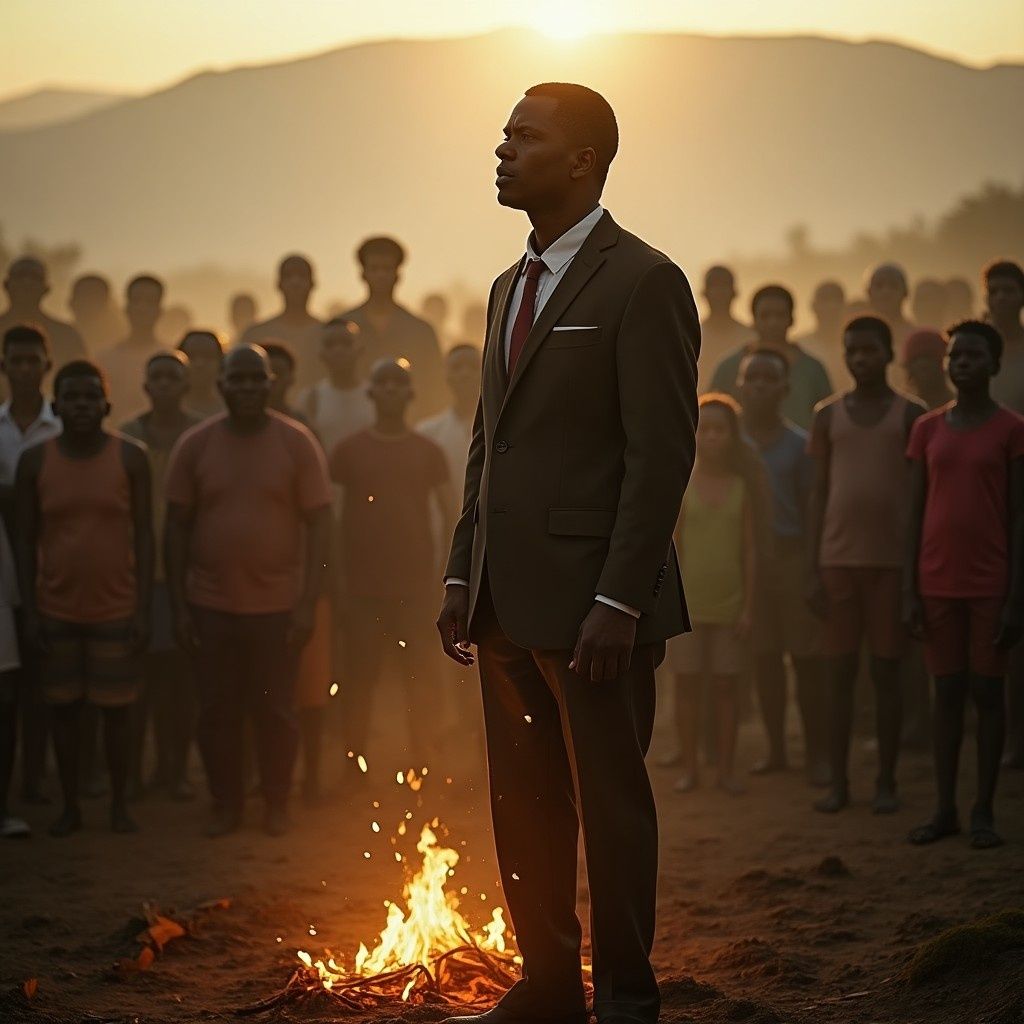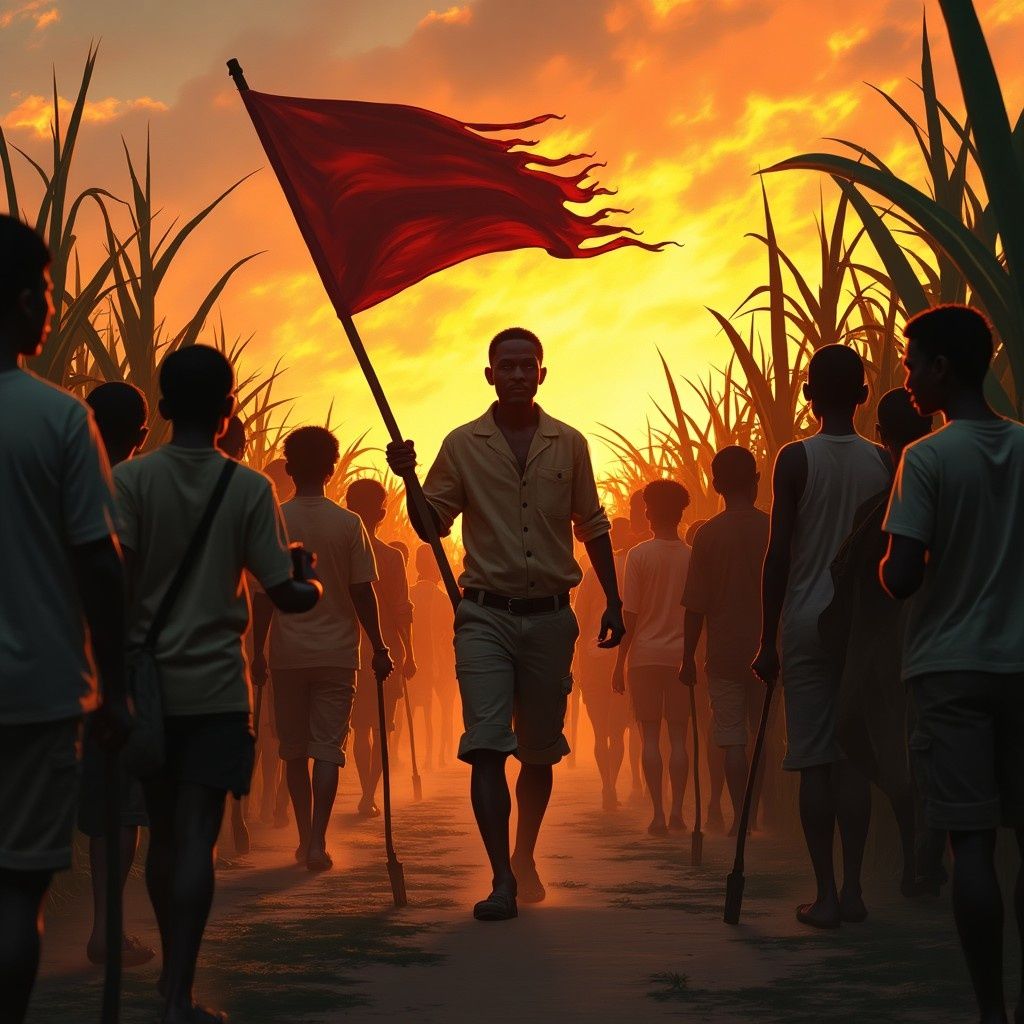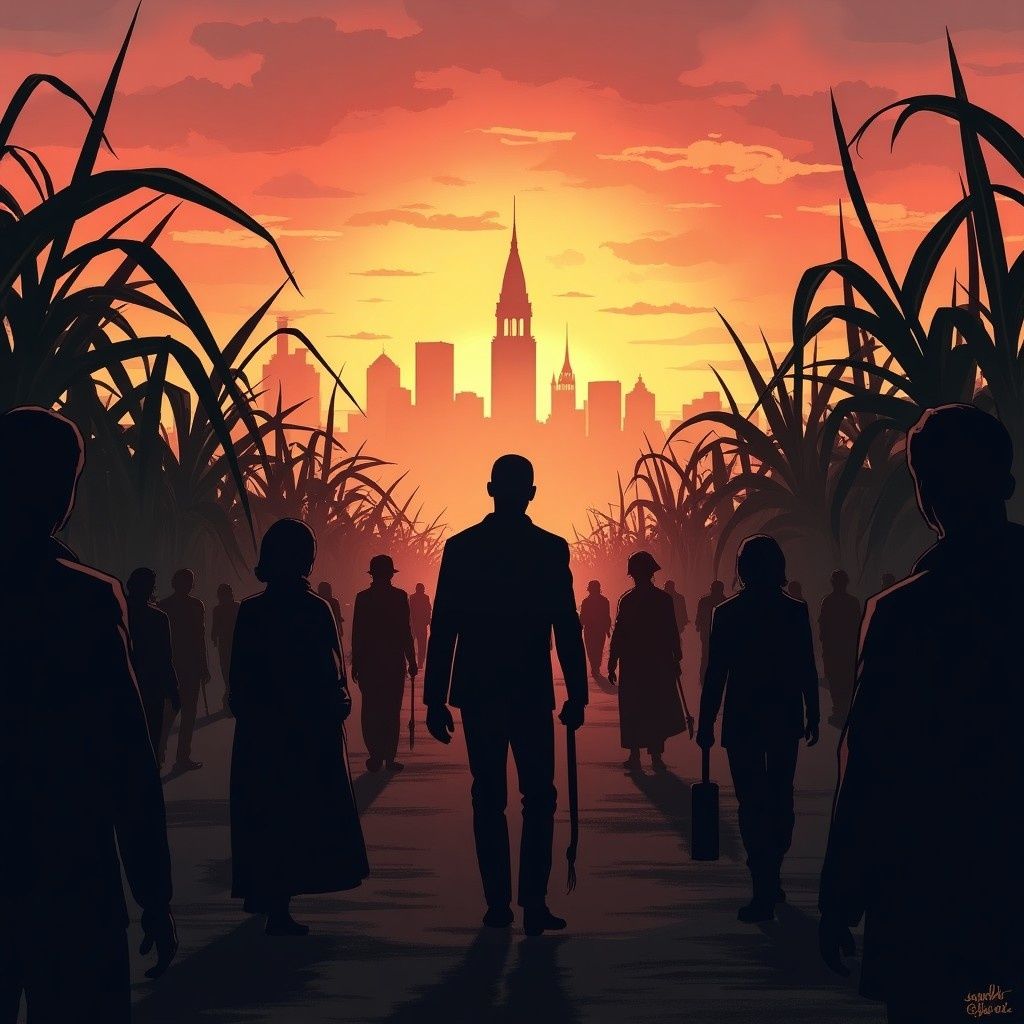Title: "The Fire Within"
The air was thick with anticipation, the kind that crackled like the dry leaves underfoot. In the dim light of dawn, Charles Deslondes stood tall, his eyes scanning the faces of those who had gathered. Each one bore the marks of their shared suffering, but today, their eyes shone with something new—hope.

"Today, we march," Charles declared, his voice steady and resolute. The murmurs of agreement rippled through the crowd, a tide of determination that would not be turned back. For too long, they had toiled under the sun, their sweat and blood watering the fields that yielded nothing but misery. Charles, a man of quiet strength, had been a driver on the Andry plantation. He knew the land, knew the people, and most importantly, he knew the taste of freedom from stories whispered in the dead of night. Tales of Haiti, where the shackles had been broken, where men and women stood as equals, fueled his resolve. As they moved, their numbers swelled. The rhythmic beat of their feet against the earth was a song of defiance, echoing through the sugarcane fields. Armed with scythes, hoes, and whatever they could muster, they were a force born of desperation and dreams. "Freedom or death," a voice cried out, and the chant was taken up, a chorus that rose to the heavens. They were not just marching; they were reclaiming their humanity, one step at a time. The first plantation fell quickly, flames licking the sky as the buildings crumbled. The fire was a beacon, calling others to join their cause. Each blaze was a testament to their will, a declaration that they would no longer be silent.

Yet, with each mile, the shadow of retaliation loomed larger. Charles knew the risks, felt the weight of them with every breath. But he also knew that change was never born from complacency. It was forged in the crucible of action, tempered by sacrifice. As they neared New Orleans, the reality of their struggle crystallized. The militias and U.S. military were waiting, armed and ready to quash the uprising. The clash was brutal, a cacophony of shouts and gunfire that shattered the morning calm.

Charles fought with the ferocity of a man who had nothing left to lose. Around him, his comrades fell, their dreams extinguished too soon. Yet, even in the face of overwhelming odds, they stood their ground, refusing to be cowed. In the end, the rebellion was crushed, its leaders captured or killed. Charles was among those who fell, his body a testament to his unyielding spirit. But the fire he had ignited could not be so easily extinguished. In the years that followed, the story of their defiance lived on, whispered in the fields, passed down through generations. It was a reminder of the strength that lay within, a beacon of hope for those who still dreamed of freedom. And so, the memory of the German Coast Uprising endured, a testament to the indomitable spirit of those who dared to rise. Though the flames had been snuffed out, the embers smoldered on, waiting for the day when they would once again ignite the fire within.

"Today, we march," Charles declared, his voice steady and resolute. The murmurs of agreement rippled through the crowd, a tide of determination that would not be turned back. For too long, they had toiled under the sun, their sweat and blood watering the fields that yielded nothing but misery. Charles, a man of quiet strength, had been a driver on the Andry plantation. He knew the land, knew the people, and most importantly, he knew the taste of freedom from stories whispered in the dead of night. Tales of Haiti, where the shackles had been broken, where men and women stood as equals, fueled his resolve. As they moved, their numbers swelled. The rhythmic beat of their feet against the earth was a song of defiance, echoing through the sugarcane fields. Armed with scythes, hoes, and whatever they could muster, they were a force born of desperation and dreams. "Freedom or death," a voice cried out, and the chant was taken up, a chorus that rose to the heavens. They were not just marching; they were reclaiming their humanity, one step at a time. The first plantation fell quickly, flames licking the sky as the buildings crumbled. The fire was a beacon, calling others to join their cause. Each blaze was a testament to their will, a declaration that they would no longer be silent.

Yet, with each mile, the shadow of retaliation loomed larger. Charles knew the risks, felt the weight of them with every breath. But he also knew that change was never born from complacency. It was forged in the crucible of action, tempered by sacrifice. As they neared New Orleans, the reality of their struggle crystallized. The militias and U.S. military were waiting, armed and ready to quash the uprising. The clash was brutal, a cacophony of shouts and gunfire that shattered the morning calm.

Charles fought with the ferocity of a man who had nothing left to lose. Around him, his comrades fell, their dreams extinguished too soon. Yet, even in the face of overwhelming odds, they stood their ground, refusing to be cowed. In the end, the rebellion was crushed, its leaders captured or killed. Charles was among those who fell, his body a testament to his unyielding spirit. But the fire he had ignited could not be so easily extinguished. In the years that followed, the story of their defiance lived on, whispered in the fields, passed down through generations. It was a reminder of the strength that lay within, a beacon of hope for those who still dreamed of freedom. And so, the memory of the German Coast Uprising endured, a testament to the indomitable spirit of those who dared to rise. Though the flames had been snuffed out, the embers smoldered on, waiting for the day when they would once again ignite the fire within.
The 1811 German Coast Uprising was the largest slave rebellion in U.S. history, occurring from January 8-10 in the Territory of Orleans, now Louisiana. Led by Charles Deslondes, the revolt saw between 64 and 125 enslaved individuals march towards New Orleans, gathering more participants along the way, totaling up to 500. Armed mostly with improvised weapons, they burned plantations and fields, but the rebellion was brutally suppressed by U.S. military and local militias, resulting in the deaths of 95 rebels. The uprising highlighted the harsh conditions of slavery and the influence of revolutionary ideas from Haiti and France, yet it was quickly quashed, and its memory has been preserved through annual commemorations and historical markers.


Comments
Post a Comment